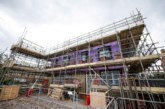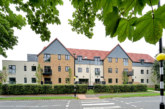
Millions of pounds in funding, made possible because of plans for devolution in the East Midlands, has been agreed and will be spent on improving housing, transport and the skills of local people.
In total, £18m of funding is being offered to Derbyshire, Nottinghamshire, Derby and Nottingham as part of early investment to the area during devolution negotiations and is not dependent on devolution proposals going ahead.
The latest funding amount of £9.9m has now been approved and will help councils to carry out retrofit work on homes to make them more energy-efficient.
Homes across Nottingham and Nottinghamshire will benefit from the scheme, specifically targeting homes with poor energy efficiency ratings — the most poorly insulated — and low-income households.
Derbyshire County Council, Nottinghamshire County Council, Derby City Council and Nottingham City Council have been working with the Government on devolution plans including a package of local powers and funding worth £1.14bn, from 2024.
Other programmes which have already been approved, and are underway or completed, include:
- £2m for a new long-term private rental scheme to address homelessness in Nottingham City and Derby City and reduce the use of bed and breakfast accommodation for temporary housing.
- £1.22m for more affordable housing in Derby, where there is currently a shortage, to provide 15 extra social houses to be let at an affordable rent. It will mean less reliance on temporary bed and breakfast placements and shorter waiting times for longer-term accommodation.
- £1.2m for new gigabit broadband for Derbyshire, Nottinghamshire, Derby and Nottingham. It will mean that an extra 118 rural public sector schools and libraries will be connected to gigabit broadband. The scheme is expected to go live by March 2024.
- £750,000 for a new cycling and walking route in Derbyshire — a 1¼ mile link connecting Markham Vale to the existing cycle route in Staveley.
- £1.5m for the new roundabout on the A6 at Fairfield in Buxton, Derbyshire, that has provided access to sites for 461 new homes, including 30% affordable homes. This work has been completed, with the funding which has just been approved going towards the cost.
- £1.5m for a new growth through green skills. The investment will enable the creation of a new £5.4m flagship skills centre and low carbon demonstrator in the region, to be operated by West Nottinghamshire College, as well as two electric minibuses for getting students to and from the site, to support the growth of a future low carbon economy as we work towards net zero.
Funding hasn’t been the only benefit drawn in through devolution; with the East Midlands securing one of just 12 new Investment Zones being created across the UK.
The low tax Investment Zones are being introduced to boost growth in areas outside London and will be clustered around universities and research centres. Each zone is to get £80m of support over five years, with tax incentives to attract businesses.
Devolution would mean a new guaranteed funding stream for our region of £38m a year over a 30-year period. Covering Derbyshire, Nottinghamshire, Derby and Nottingham, the devolved area is home to around 2.2 million people, making it one of the biggest in the country.
The devolution deal includes an extra £16m for new homes on brownfield land and control over a range of budgets like the Adult Education Budget, which could be better tailored to the needs of people in local communities.
A regional mayor would lead a new combined authority, which would include representatives from existing local councils, with decision making powers and resources moving from London to the East Midlands. Local businesses would also have a voice, as well as other organisations.
Devolution would not mean scrapping or merging local councils, which would all continue to exist as they do now and would still be responsible for most public services in the area. The mayor and combined authority would instead focus on wider issues like transport, regeneration, and employment across both cities and counties.
Ben Bradley MP, Leader of Nottinghamshire County Council, said: “It’s fantastic news that by working together we’ve secured yet another investment. This time new funding will help more homes to be energy efficient and help reduce bills for those who need it the most.
“Working with partners, we have previously led trials to help test and monitor the most effective ways to heat homes and soon more residents across the region will benefit.
“This is just taster of what could be achieved under the devolution deal.
Barry Lewis, Leader of Derbyshire County Council, commented: “We’ve been pursuing a devolution deal to bring more investment to the region and this early funding pot to improve housing, transport and skills is most welcome.
“If a devolution deal for the East Midlands goes ahead, it will bring a package of local powers and much-needed funding worth £1.14bn that will help to improve the lives of people in Derbyshire and throughout the region. Devolution would bring massive benefits and opportunity to the East Midlands for things like improving transport infrastructure, building more homes and creating more jobs and better training opportunities.”
Baggy Shanker, Leader of Derby City Council, said: “As a new leader coming into the devolution space, it’s good to see actual benefits being realised in the region, especially ones that are able to support some of our lower-income households and families. These schemes signal steps in the right direction, both in terms of securing much-needed funding — especially relevant for Derby, whose core spending power is the lowest in our region — and also decision making.
“Decisions about our area and our communities should be made by locally elected and locally accountable representatives; for too long too many decisions affecting too many people have been made by too few.”
David Mellen, Leader of Nottingham City Council, added: “I welcome this extra investment as part of our ongoing plans for devolution — especially the £9.9m to retrofit homes to become more energy-efficient. This will not only help keep bills lower during the current cost-of-crisis but will also support Nottingham’s ambition to become a carbon neutral city by 2028.
“Investment like this is a clear indication of the benefits that devolution would bring, with a potential £1.1bn funding pot to support our combined cities, towns and villages. The East Midlands desperately needs this investment.
“A devolution deal would help to create more jobs and training opportunities, improve transport infrastructure and create more homes for local people.”
Now the four councils have formally backed the plans, and agreed on a final version of the proposal, it means that new local powers and funding to improve the environment, skills training, transport, housing, and the economy could be in place as soon as next year.
For that to happen, new legislation is needed, so that a new form of Combined Authority can be created. With new legislation in place, proposals for devolution could be sent to the Government for approval and Royal Assent, meaning that devolution in the East Midlands could be a reality from spring 2024, with the first ever election for a regional mayor, covering Derbyshire, Nottinghamshire, Derby, and Nottingham, taking place in May 2024.
For more information, about devolution please visit www.eastmidlandsdevolution.co.uk.
Header image: ©thinglass/AdobeStock









